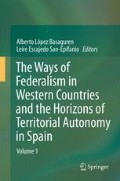Abstract
The federal principle has been applied to integrate spare polities since the classical days of Roman Empire. It has proved its ability to solve integration problems of legally and politically autonomous communities that, in order to confront mutual challenges and problems, face the necessity to become a new entity without losing their own political and legal identity.
In modern times, the federal integration paradigm was designed and adopted by the United States of America after their independence from Great Britain.
This paper tries to demonstrate that such model can be, abstracting it from its original application to that polity, applied as well to organize political communities other than countries, including supra-state structures, such as European Union or even the global community.
Access this chapter
Tax calculation will be finalised at checkout
Purchases are for personal use only
References
Easton, D. (1996). Esquema para el análisis político. Buenos Aires: Amorrortu, 192 pp.
Elazar, D. J. (1994). Federalism and the way to peace. Ontario: Queen's Univesrity, 170 pp.
Habermas, J. (2000). La Constelación Posnacional. Barcelona: Paidós, 218 pp.
Held, D. (1995). Democracy and the Global Order. Stanford, Cal.: Stanford University Press, 324 pp.
Kant, M. (1972). La paz perpetua. México: Porrúa, 289 pp.
La Pérgola, A. (1994). Los nuevos senderos del federalismo. Madrid, CEPC, 210 pp.
MacCormick, N. S. (2001). Questioning sovereignty. Law, state and nation in the european commonwealth. Oxford: Oxford University Pess, 297 pp.
Author information
Authors and Affiliations
Corresponding author
Editor information
Editors and Affiliations
Rights and permissions
Copyright information
© 2013 Springer-Verlag Berlin Heidelberg
About this chapter
Cite this chapter
de Urdanivia, X.D. (2013). The Challenges of the Federative Principle in the Twenty-First Century. In: López Basaguren, A., Escajedo San Epifanio, L. (eds) The Ways of Federalism in Western Countries and the Horizons of Territorial Autonomy in Spain. Springer, Berlin, Heidelberg. https://doi.org/10.1007/978-3-642-27720-7_10
Download citation
DOI: https://doi.org/10.1007/978-3-642-27720-7_10
Published:
Publisher Name: Springer, Berlin, Heidelberg
Print ISBN: 978-3-642-27719-1
Online ISBN: 978-3-642-27720-7
eBook Packages: Humanities, Social Sciences and LawLaw and Criminology (R0)

